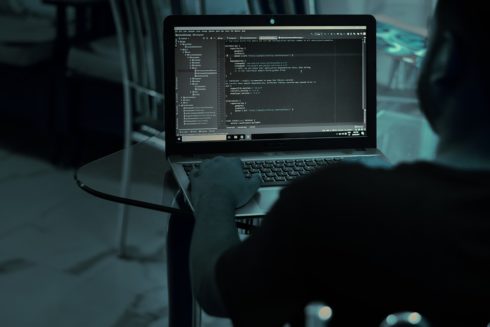
In the past few weeks the coronavirus pandemic has taken hold in the United States, and the disease will continue to have a massive impact around the world for the foreseeable future. But even in the midst of panic and uncertainty, communities are coming together to do what they can. People are 3D printing face shields and sewing masks for healthcare workers, offering to buy groceries and household supplies for the elderly or immunocompromised, and even donating their computer’s GPU power to the cause.
And developers aren’t absent from this list of people trying to do whatever they can to help. A quick glance into the trending section of GitHub shows that a good portion are COVID-19-related, and there are a number more than that living on GitHub. While medical professionals are on the front lines of the COVID-19 fight, developers are fighting the disease from their computers.
The open-source projects related to COVID-19 cover a wide variety of areas, from informational dashboard to DIY designs. Here are just a few examples of projects targeting COVID-19:
- An interactive dashboard tracking the number of cases, deaths, and recoveries – by country, based on the open COVID-19 dataset provide by Johns Hopkins University
- Folding@Home, which has been around for some time now, but is redirecting resources to COVID-19 research. Folding@Home allows PC owners to donate their GPU computing power to run simulations of protein dynamics. The organization behind Folding@Home is now focusing efforts on researching how the virus’ proteins work and designing therapeutics to stop them
- A design for a low-cost open-source ventilator made from a CPAP machine. The US currently does not have the number of ventilators needed to support a large portion of the population needing them at once, and this might be a viable last resort.
- A website where people can self-report symptoms to combat lack of testing
- A list of tech companies and the status of whether or not their internship programs have been cancelled
- We Are Still Open, a website created to support local food businesses struggling during COVID-19 by connecting their take-out or delivery options to consumers.
- COVID-Net, a project that aims to help more quickly and accurately identify COVID-19 infections from chest x-ray.
“In the midst of the uncertainty and seriousness of COVID-19, we’ve been inspired to see a global community of scientists, government officials, journalists, programmers, and concerned citizens come together to collaborate on a variety of projects with the shared goal of understanding COVID-19 and coordinating on the best response. Even though many of these projects aren’t traditional software projects, the same collaborative development model is being applied to curated data sets, DIY instruction sets, and more,” Martin Woodward, director of developer relations at GitHub, wrote in a post.
According to Woodward, these projects aren’t just limited to developers. “Depending on your background, there are lots of ways to lend a hand even if you are not a developer,” said Woodward.
For example, COVID-Net is primarily being worked on by researchers and data scientists, though DarwinAI CEO Sheldon Fernandez said that developers are still needed for things like writing software to collate and cleanse data, creating tools to assess sample quality and variance, or wrapping the application in a nice UI to make it easily accessible to radiologists and healthcare professionals.
Daniel Krook, chief technology officer of the Call for Code Global Initiative and IBM Code and Response, added that last year’s Call for Code winning team included a firefighter, a nurse, a project manager, a data scientist, and a developer.
Call for Code expands focus to COVID-19
This year’s Call for Code will be another avenue for developers to contribute to the COVID-19 fight. Call for Code 2020 had an initial theme of projects that would help fight climate change, but the organization has recently expanded their scope by adding a second track focused on the pandemic.
Call for Code’s website calls for projects that address three main COVID-19 areas: crisis communication, remote education, and community cooperation. “Our goal for Call for Code in the COVID-19 track isn’t to find vaccines, it’s not to do deep research, it’s not to enable medical solutions,” said Krook. “What it’s focused on is a few of the social, the business, the community aspects of how this pandemic is affecting people.”
According to the organization, communications systems are often the first to be overwhelmed in a crisis. Technologies like chatbots can help respond to thousands of messages a day and can be critical in helping communities get the information they need, such as proper hand washing techniques, how to properly detect symptoms, or local updates on quarantine.
Several communities are being impacted by schools being closed or going remote, which presents a number of challenges, especially for parents who are now working from home with no child care. Call for Code is asking for projects that can help parents and educators navigate remote education.
The third area that projects could focus on is community cooperation. Technology can help communities better deal with a crisis by incorporating information like weather data or local food and medical supply information.
IBM is offering starter kits for each of these three areas. The crisis communication and community cooperation starter kits both provide access to Watson Assistant, which can be used to “build, train, and deploy conversational integrations into any application, device, or channel.” The remote education starter kit includes a set of open-source tools that will allow educators to make content more readily available for their students.
“The goal is, and as it always has been for IBM’s role in Call for Code, is to take those really important pressing issues that have been identified by our partners, like the United Nations, and give people the tools they can use today to immediately start building solutions,” said Krook.
Like previous Call for Code events, the winning project teams will get support from IBM in deploying their projects. According to Krook, the timeline of Call for Code will be accelerated this year. Deadlines will not change, but any projects submitted before the initial submission deadline will be judged and have the potential for mentorship from IBM prior to the deadline.
Hackathons forming to deal with the crisis, too
Hackathons are also popping up to deal with COVID-19. A big one right now, which has the support of the World Health Organizations and major tech companies like AWS, Facebook, Microsoft, and Slack, is the COVID-19 Global Hackathon.
The hackathon is suggesting six areas that projects could focus on: health, vulnerable populations, businesses, community, education, and entertainment. The team behind the hackathon intends these to be areas to spark ideas, not necessarily a restrictive list of areas a project could address.
“Given the isolation currently being experienced within communities right now, we want to create an online space where developers can ideate, experiment and build software solutions to help address this crisis,” the team wrote in a post.
Project ideas, along with a two-minute video walkthrough, may be submitted through March 30 at 9:00 AM PST, and accepted projects will be announced on April 3.






